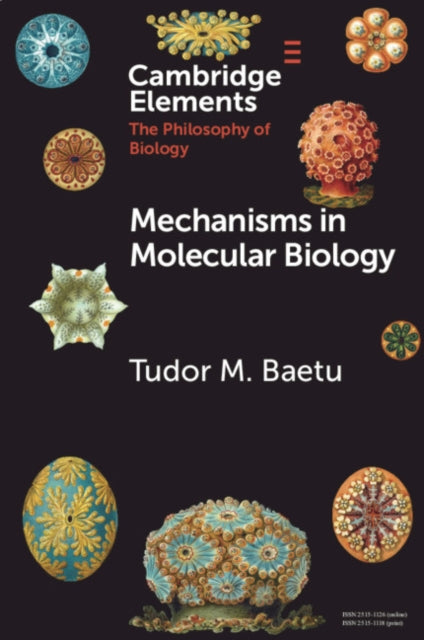Tudor Baetu
Mechanisms in Molecular Biology
Mechanisms in Molecular Biology
YOU SAVE £4.08
- Condition: Brand new
- UK Delivery times: Usually arrives within 2 - 3 working days
- UK Shipping: Fee starts at £2.39. Subject to product weight & dimension
Bulk ordering. Want 15 or more copies? Get a personalised quote and bigger discounts. Learn more about bulk orders.
Couldn't load pickup availability
- More about Mechanisms in Molecular Biology
The new mechanistic philosophy is divided into two projects: metaphysical inquiry into mechanisms and epistemic issues related to their discovery and intelligibility. Tudor Baetu explores and explains these projects, proposing a compatible account that bridges the gap between them and is compatible with experimental design and scientific interpretations of experimental results.
Format: Paperback / softback
Length: 100 pages
Publication date: 10 October 2019
Publisher: Cambridge University Press
The new mechanistic philosophy is a multifaceted endeavor that encompasses two distinct yet interconnected projects. The first project delves into a metaphysical exploration, seeking to understand the intricate relationships between mechanisms and fundamental concepts such as causation, capacities, and levels of organization. This project aims to unravel the underlying principles that govern the functioning of mechanical systems and their impact on the world around us.
On the other hand, the second project revolves around epistemic concerns, focusing on the discovery of mechanisms and the interpretation of mechanistic representations. It seeks to address the challenges of comprehending the nature of mechanistic explanations and their validity in scientific inquiry. This project involves exploring the methods and strategies employed in mechanistic research, as well as the criteria for evaluating the reliability and validity of mechanistic models.
To navigate these complex endeavors, Tudor Baetu takes on the task of exploring and elucidating these projects. He provides a comprehensive account that bridges the gap between the two, offering a coherent framework for understanding the mechanistic worldview. Baetu's proposed account is not only compatible with the assumptions and practices of experimental design in biological research but also aligns with scientifically accepted interpretations of experimental results.
In the first project, Baetu delves into the metaphysical dimensions of mechanisms. He examines how mechanisms relate to issues such as causation, capacities, and levels of organization. He explores the concept of causation, investigating the different types of causes and the mechanisms through which they operate. He also examines the relationship between mechanisms and capacities, exploring how they determine the capabilities and limitations of mechanical systems.
Furthermore, Baetu explores the concept of levels of organization, examining how different levels of organization contribute to the functioning of mechanical systems. He discusses the hierarchical structure of organizations, the role of feedback loops, and the emergent properties that arise from the interactions between components. By analyzing these levels of organization, Baetu sheds light on the complex dynamics and emergent behaviors that characterize mechanical systems.
In the second project, Baetu focuses on epistemic issues related to the discovery of mechanisms and the interpretation of mechanistic representations. He examines the methods and strategies employed in mechanistic research, including experimental design, data analysis, and model validation. He discusses the criteria for evaluating the reliability and validity of mechanistic models, including the principles of parsimony, consistency, and explanatory power.
Baetu also explores the challenges of comprehending mechanistic explanations, including the nature of causation, the role of probabilities, and the limitations of mechanistic models. He discusses the concept of emergence, which refers to the process by which complex systems emerge from the interactions between simpler components. By examining the nature of emergence, Baetu provides insights into the limitations of mechanistic explanations and the need for a more holistic understanding of complex systems.
To bridge the gap between the two projects, Baetu proposes a comprehensive account that integrates metaphysical inquiry with epistemic concerns. He argues that mechanisms can be understood as physical entities that operate according to certain principles, and that these principles can be discovered through empirical research. He also suggests that mechanistic representations can be interpreted in a way that is consistent with scientific evidence and that they can provide valuable insights into the functioning of mechanical systems.
In conclusion, the new mechanistic philosophy is a multifaceted endeavor that encompasses two distinct yet interconnected projects. The first project deals with a metaphysical inquiry into the relationships between mechanisms and fundamental concepts such as causation, capacities, and levels of organization. The second project focuses on epistemic issues related to the discovery of mechanisms and the interpretation of mechanistic representations. Tudor Baetu's proposed account bridges the gap between these projects, offering a coherent framework for understanding the mechanistic worldview. His account is compatible with the assumptions and practices of experimental design in biological research and aligns with scientifically accepted interpretations of experimental results. By exploring and elucidating these projects, Baetu contributes to our understanding of the complex world of mechanistic systems and their implications for scientific inquiry.
Weight: 100g
Dimension: 230 x 152 x 5 (mm)
ISBN-13: 9781108742306
This item can be found in:
UK and International shipping information
UK and International shipping information
UK Delivery and returns information:
- Delivery within 2 - 3 days when ordering in the UK.
- Shipping fee for UK customers from £2.39. Fully tracked shipping service available.
- Returns policy: Return within 30 days of receipt for full refund.
International deliveries:
Shulph Ink now ships to Australia, Belgium, Canada, France, Germany, Ireland, Italy, India, Luxembourg Saudi Arabia, Singapore, Spain, Netherlands, New Zealand, United Arab Emirates, United States of America.
- Delivery times: within 5 - 10 days for international orders.
- Shipping fee: charges vary for overseas orders. Only tracked services are available for most international orders. Some countries have untracked shipping options.
- Customs charges: If ordering to addresses outside the United Kingdom, you may or may not incur additional customs and duties fees during local delivery.


